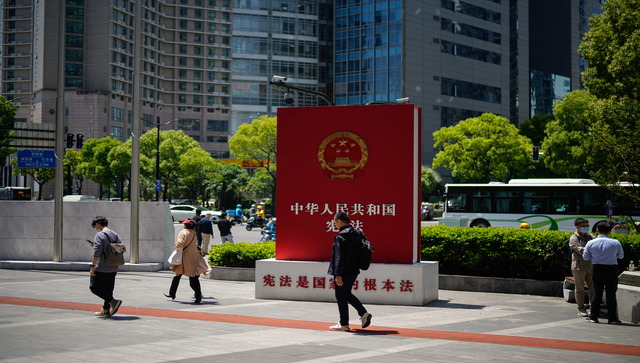China is reportedly using foreign influencers, including from the United States, the United Kingdom and New Zealand, to push its propaganda. According to the think tank the Australian Strategic Policy Institute (ASPI), these international influencers, who enjoy a massive following on social media, endorse pro-Chinese Communist Party (CCP) narratives as well as defend China’s position on sensitive issues. In a report titled ‘Singing from the CCP’s songsheet’, analysts Fergus Ryan and Daria Impiombato, along with independent contractor on contemporary Chinese politics and media Matt Knight, examined the content produced by more than 120 foreign influencers who have active accounts on Chinese video-streaming platforms such as Bilibili, Douyin, Xigua and Toutiao. Let’s take a look at what the think tank found. China and its network of foreign influencers As per the Canberra-based think tank, CCP, the ruling party of China, intends to ‘cultivate’ a group of “foreign mouths”, “foreign pens” and “foreign brains who can assist in augmenting the state’s narrative. With this, Beijing wants to guard itself against foreign influence and shift the global narrative in its favour. “By coordinating foreign influencers and other communicators, Beijing aspires to create a unified choir of voices capable of promoting party narratives more effectively than traditional official PRC (People’s Republic of China) media. The ultimate goal is to shield CCP-controlled culture, discourse and ideology from the dangers of foreign and free political speech, thereby safeguarding the party’s legitimacy,” the ASPI report said. The think tank said China has developed these foreign influencers, who boast of millions of followers in the Asian country as well as overseas on platforms like TikTok, YouTube and Twitter (now X), as “unique propaganda assets”. How does it work? The analysts found that Beijing is setting up multilingual influencer studios to further its agenda with the help of domestic and foreign influencers who spread pro-China propaganda to younger global audiences. To woo these influencers so they promote its propaganda, the CCP is coming up with competitions that offer “significant prize money” and other incentives. The ruling party in
China has also roped in international students at Chinese universities, building them as a “latent talent pool of young, multilingual, social-media-friendly influencers”, noted ASPI. Citing an instance, the think tank observed that Huaqiao University’s ‘Overseas New Voice Generation’ new media studio aims to use students from Hong Kong, Macao and Taiwan, along with other foreign students in China to “tell China’s story well, communicate China’s voice well, and give full play to their ‘others’ perspective’ and ‘youth discourse’ advantage in cross-cultural communication”. [caption id=“attachment_13441082” align=“alignnone” width=“640”] Influencers played a major role in controlling the global narratives about COVID-19 in China. Reuters File Photo[/caption] In 2021, over 200 international students from 16 countries, including the US and Ireland, had taken part in related video shoots. The think tank observed that the CCP is using Russian influencers in China to bolster its goal of strengthening bilateral ties with Moscow to counter Western countries. How influencers have helped China Foreign influencers have had a major role in controlling the global narratives about COVID-19 in China, as per ASPI’s report. They have also tried to advance CCP’s account abroad. These influencers are being “guided” to defend or push China’s perspective on sensitive political subjects, such as human rights concerns or territorial disputes, the think tank noted. The CCP-aligned content produced by influencers has helped in ramping up the prevalence of party-approved narratives on YouTube on various topics, including Xinjiang. These influencers have been able to sneak into even mainstream foreign outlets, including major US cable TV outlets, to push Chinese propaganda.
👆The guy smashing his iPhone after buying a Huawei is Bart Baker, a US YouTuber known for creating parody videos of famous songs.
— Fergus Ryan (@fryan) November 26, 2023
He left his 10M+ YouTube subscribers in 2019 to operate exclusively on Chinese platforms where his content style took a dramatic turn. pic.twitter.com/A4Vk4WLJEz
What is in it for them? The ASPI report mentioned that foreign influencers have discovered that “appealing to Chinese audiences’ sense of nationalism can provide a fast track to gain popularity, increase their online presence and, ultimately, generate more revenue." China’s internet regulations restrict “negative” content and promote “(Chinese president) Xi Jinping thought” and “core socialist values” and posts that “increase the global influence of Chinese culture”. “Indeed, China’s internet regulations encourage users to actively promote party propaganda – so many influencers have adapted to thrive in that system,” the ASPI added. For instance, US vlogger Jerry Kowal had made several videos lauding China’s response to COVID-19 and criticised his home country’s. This helped him gain the approval of China Central Television (CCTV), a key state television broadcaster in the Asian country. In 2016, Australian swimmer Mack Horton after winning the Olympic Gold in Rio de Janeiro attacked silver medalist Sun Yang, a Chinese swimmer, who had earlier been suspended for violating a drug test. Soon after, David Gulasi, an Australian digital influencer living in China, was advised by a Chinese influencer management agency to pick a public fight with Horton. He hit out at the Australian swimmer and invoked Chinese nationalism. ASPI’s warning The defence and strategic policy think tank has cautioned that Beijing’s strategy is “likely to have significant implications for the global information landscape.” “The growing use of foreign influencers will make it increasingly difficult for social-media platforms, foreign governments and individuals to distinguish between genuine and/or factual content and propaganda,” the think tank warned, saying it would become harder to counter disinformation “and protect the integrity of public discourse.” Eventually, “the line between independent voices and those influenced by the Party’s narratives may become increasingly blurred, further challenging the ability of audiences to discern reportage from manipulation,” ASPI said. With inputs from agencies


)

)
)
)
)
)
)
)
)



